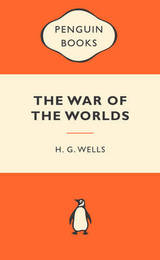
|
The War of the Worlds: Popular Penguins
Paperback / softback
Main Details
| Title |
The War of the Worlds: Popular Penguins
|
| Authors and Contributors |
By (author) H. G. Wells
|
| Physical Properties |
| Format:Paperback / softback | | Pages:192 | | Dimensions(mm): Height 179,Width 111 |
|
| ISBN/Barcode |
9780141045412
|
| Audience | |
|---|
|
Publishing Details |
| Publisher |
Penguin Books Ltd
|
| Imprint |
Penguin Books Ltd
|
| Publication Date |
29 June 2009 |
| Publication Country |
United Kingdom
|
Description
The night after a shooting star is seen streaking across the sky, a cylinder is discovered near London. Armed with just a white flag, the locals approach the mysterious object - only to be burned alive by heat-rays as horrific, tentacled invaders emerge. Soon, the whole of human civilization is under threat, as powerful Martians move across the land in massive killing machines, armed with black gas and burning rays. The aliens are determined to win the Earth for themselves.
Author Biography
H. G. Wells, the third son of a small shopkeeper, was born in Bromley in 1866. After two years' apprenticeship in a draper's shop, he became a pupil-teacher at Midhurst Grammar School and won a scholarship to study under T. H. Huxley at the Normal School of Science, South Kensington. He taught biology before becoming a professional writer and journalist. He wrote more than a hundred books, including novels, essays, histories and programmes for world regeneration. Wells, who rose from obscurity to world fame, had an emotionally and intellectually turbulent life. His prophetic imagination was first displayed in pioneering works of science fiction such as The Time Machine (1895), The Island of Doctor Moreau (1896), The Invisible Man (1897) and The War of the Worlds (1898). Later he became an apostle of socialism, science and progress, whose anticipations of a future world state include The Shape of Things to Come (1933). His controversial views on sexual equality and women's rights were expressed in the novels Ann Veronica (1909) and The New Machiavelli (1911). He was, in Bertrand Russell's words, 'an important liberator of thought and action'. Wells drew on his own early struggles in many of his best novels, including Love and Mr Lewisham (1900), Kipps (1905), Tono-Bungay (1909) and The History of Mr Polly (1910). His educational works, some written in collaboration, include The Outline of History (1920) and The Science of Life (1930). His Experiment in Autobiography (2 vols., 1934) reviews his world. He died in London in 1946.
|